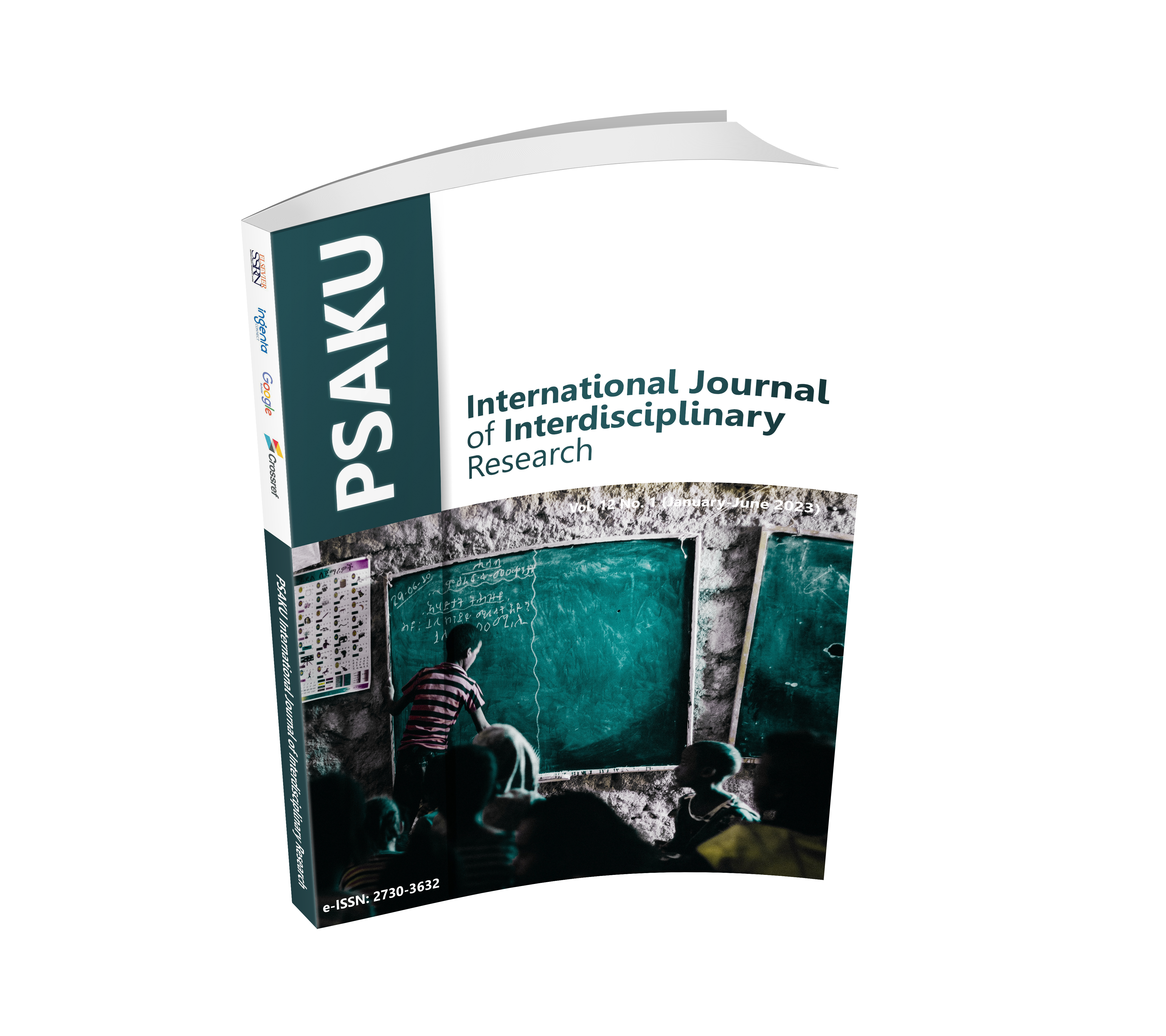REINFORCEMENT OF PROFESSIONAL LEARNING COMMUNITY PROCESS FOR PROFESSIONAL ETHICS DEVELOPMENT OF STUDENT TEACHERS BY INFORMATION TECHNOLOGY SYSTEM
DOI:
https://doi.org/10.14456/psakuijir.2023.4Keywords:
Professional Learning Community Development, Student Teacher Internship, Teacher EthicsAbstract
This research aims to develop the model reinforcing professional learning community through information technology system (E-PLC). The study was sectioned into four stages as follows:
The first stage which is investigating the components and guidelines for the E-PLC revealed that the E-PLC consisted of seven components which hold significance at the highest level. The guidelines for each component include 1) principles, 2) objectives, 3) inputs, 4) processes, 5) outcomes, 6) impacts, and 7) success factor. The second stage of constructing the E-PLC model with seven components which was validated by experts, in overall and individual aspect, indicated suitability of the model at the highest level. The third stage of operationalizing the E-PLC model revealed that the model can reinforce PLC, in overall and individual aspect, at the high level; the students’ knowledge achievement on constructing PLC showed a higher test score of the post-implementation than that of the pre-implementation of the model at the significance level of .01; and the competence assessment of students in creating PLC, in overall and individual aspects, was rated at a high level. The fourth stage of the E-PLC model’s evaluation revealed that the usefulness was rated at the highest level while the feasibility for model implementation was rated at a high level. This study also provides recommendations for application towards Teachers’ Council, university, faculty and program, and student teacher. Furthermore, there should be an annual monitoring study of the E-PLC in order to develop a comprehensive framework adjustable to various evolving trends and changes.
Downloads
References
Adae, K. (2018). Development of Professional Learning Community Model by Collaborative Action Research for Primary School. Doctor of Philosophy Thesis, Burapha University.
Barber, J. (2009). Integration of Learning: Meeting Making for Undergraduates Through Connection, Application, and Synthesis. Doctor of Philosophy Thesis, University of Michigan.
Buffum, A., & Hinman, C. (2006). Professional learning communities: reigniting passion and purpose. Leadership, 35(5), 16-19.
Burnette, R. (2002). How we formed our community. Retrieved from www.nsdc.org/librarg/isd/burnette2311.html.
Criteria and Methods of Testing and Assessment of Teacher Professional Competencies (2nd edition), 2021.
Dufour, R., Dufour, R., Eaker, R., & Many, T. (2010). Learning by doing: A handbook for Professional learning communities at work. 2nd ed. Indiana: Solution Tree.
Gureckis, T., & Markant, D. (2012). Self-Directed Learning: A Cognitive and Computational Perspective. Perspectives on Psychological Science, 7(5), 464-481.
Hinman, C. (2007). Developing a substantive professional learning community. National Forum of Educational Administration and Supervision Journal, 24(1), 29-35.
Hord, S. (1997). Professional learning communities: Communities of inquiry and improvement. Texas: Southwest Educational Development Laboratory.
Intanam, N. (2010). Development of a benchmark for building professional learning communities in schools. Doctor of Philosophy Thesis, Chulalongkorn University.
Kaewchoti, K. (2007). The Use of Information Technology for School Administration of Administrators under Songkhla Educational Service Area Office. Master’s Thesis, Prince Songkla University.
Keiler, L. (2018). Teachers’ roles and identities in student-centered classrooms. International Journal of STEM Education, 5(34), 1-20.
Khiat, H. (2017). Academic Performance and the Practice of Self-Directed Learning: The Adult Student Perspective. Journal of Further and Higher Education, 4(1), 44-59.
Knapp, M., McCaffrey, T., & Swanson, J. (2003). District Support for Professional Learning: What Research Says and Has Yet Establish. A paper presented at the Annual Meeting of the American Educational Research Association, Chicago, USA.
Leuanoi, A. (2018). The Professional Learning Community Management Model of World Class Standard School. Doctor of Education Thesis, Nakhon Sawan Rajabhat University.
Ministry of Education. (2017). Handbook of Training Process Driving PLC (Professional Learning Community) Professional Learning Community to School. Bangkok: Ministry of Education.
Ministry of Education. (2021). Digital Transformation for Education Action Plan, Ministry of Education, 2020-2022. Bangkok: Ministry of Education.
Nemec, P. (2011). The self-directed learner. Psychiatric Rehabilitation Journal, 35(1), 71-73.
Ngam-kanok, S. (2015). The Development Teachers' Capability in Using Information Technology to Administer Educational Institutions in Eastern Region. Journal of Education and Social Development, 11(2), 282-292.
Office of the Teacher Civil Service and Educational Personnel Commission. (2019). Criteria and Methods for Government Teachers and Educational Personnel to Position Teachers There are academic standings and postponement of academic standings.
Phillips, J. (2003). Powerful learning: Creating learning communities in urban school reform. Journal of curriculum and Supervision, 18(3), 240-258.
Regulation of the Teachers' Council Regarding Professional Ethics, 2013.
Regulation of the Teachers’ Council of Thailand on Professional Standards (Version 4), 2019.
Rentfro, E. (2007). Professional Learning Communities Impact Student Success. Leadership Compass, 5(2), 1-3.
Senge, P. (1990). The Fifth Discipline: The Art & Practice of the Learning Organization. New York: Doubleday Dell Publishing.
Sergiovanni, T. (1994). Building community in schools. California: Jossey-Bass.
Sooksumlee, W. (2012). The Effects of Using Cooperative Multimedia with Team Game Tournament Technique on Multiplication in Mathematics Subject for Prathomsuksa 3 Students. Veridian E-Journal, 5(2), 554-568.
Teachers' Council of Thailand. (2021). The process of promoting the learning community process Professional ethics to develop professional ethics through the information technology system (E-PLC) for the year 2021. Bangkok: Teachers' Council of Thailand.
Victoria State Government. (2021). Professional Learning Communities. Retrieved from www.education.vic.gov.au/school/teachers/management/improvement/plc/Pages/default.aspx.
Yamkasikorn, M. (2021). The role of school administrators and professional learning communities. A paper presented at the Teachers’ Council Academic Meeting 2018, Bangkok, Thailand.
Zwass, V. (2020). Information retrieval system, information storage and retrieval system, information storage system. Retrieved from www.britannica.com/topic/information-system.

Downloads
Published
How to Cite
Issue
Section
License
Copyright (c) 2023 Authors

This work is licensed under a Creative Commons Attribution-NonCommercial-NoDerivatives 4.0 International License.











.png)


